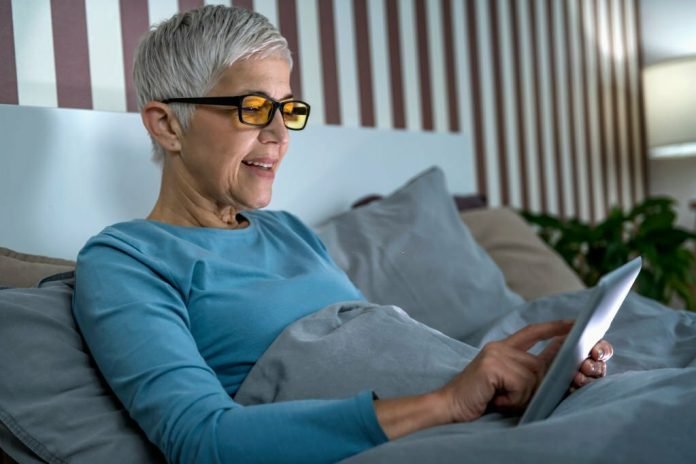Blue light-blocking glasses are a popular option for women working from home or spending a long time on their computers.
However, it’s important to note that these lenses haven’t been shown to reduce eyestrain or improve sleep.
Look for frames that fit comfortably and won’t pinch the bridge of your nose or put pressure on your ears.
Also, ensure your glasses include UV protection.
What are Blue Light Blocking Glasses?
Women’s blue light glasses are eyewear lenses that filter out specific wavelengths of visible light while allowing other wavelengths to pass through.
These lenses can be added to almost any glasses prescription to provide benefits including anti-reflective and glare reduction for better vision while using digital screens, as well as protecting the eyes from high-energy blue light that may interfere with sleep patterns and lead to symptoms such as dry eyes, blurred vision, and headaches.
While healthy exposure to natural blue light during the day promotes alertness and helps regulate our sleep-wake cycles, too much light exposure later in the evening can disrupt sleep, leading to poor quality and grogginess in the morning.
Many electronic devices, such as tablets, smartphones, computers, and televisions, emit this blue light.
Blue light-blocking glasses help reduce the amount of artificial blue light you are exposed to late at night, allowing you to fall asleep more quickly and have a better overall sleep cycle.
While experts aren’t sure whether or how much blue light damages your eyes, it is generally agreed that reducing exposure to it can reduce eye strain, dry eyes, and headaches associated with long periods spent staring at screens.
Aside from wearing blue light-blocking glasses, limiting screen time in the evenings and taking frequent breaks are recommended to protect your eyes and keep them as healthy as possible.
How Do Blue Light Blocking Glasses Work?
Blue light is a type of high-frequency visible light that digital devices emit. The purpose of blue light-blocking glasses is to prevent the light from reaching your retina, which may cause eye strain.
Many popular electronic devices, including computer monitors, tablets, smartphones, gaming systems, and televisions, emit a certain amount of blue light, which can cause eyestrain.
Often, this happens when you use these devices late into the night, making it hard to fall asleep and disturbing your sleep cycle. Blue light-blocking glasses help filter the blue light out, allowing you to fall asleep quickly and not be interrupted by your screens.
When choosing a pair of blue light blockers, it is essential to check the tinting; previous research has found that amber-tinted lenses are more effective at filtering out harmful blue light.
The best online retailers offer prescription glasses that can be bolstered with blue light-blocking add-on coatings for a minimal cost, and in most cases, these are available for all frames and prescriptions, whether reading or bifocals.
Alternatively, there are also blue light glasses designed to fit over the top of your existing pair of glasses.
These are usually less expensive and can be worn for as long or as short as you need.
Most blue light glasses also include anti-glare coating, which decreases the reflection from your screen, further reducing any potential eye strain and discomfort.
Are Blue Light Blocking Glasses Right for Me?
Blue light-blocking glasses can be an excellent addition to your eye care routine if you spend a lot of time in front of a computer or screen.
They can help ease the symptoms of digital eyestrain and improve your sleep quality by filtering out some harmful light emitted by electronic devices, especially before bedtime.
The best blue light glasses will be lightweight and fit comfortably on your face without pinching or weighing down your ears or nose.
Look for frames with multiple size options, including those designed to fit prescription glasses or offered with non-prescription lenses.
Also, check that the glasses are made with a high-transmittance lens coating to ensure that the frames block the maximum amount of blue light possible while remaining transparent enough to be functional.
Most blue light filters have a yellow or orange tint that absorbs the most harmful wavelengths of blue light and blocks them from reaching your eyes.
However, you can also find clear or less-obviously tinted lenses that will still filter out some damaging blue light.
It’s important to note that little scientific evidence shows that blue light filter glasses help with eye strain or improve sleep.
Most studies that have compared blue light filter glasses to non-filtered blue light glasses have found no significant differences in symptoms or sleep disruptions.
Instead, it’s recommended to practice good habits, such as taking regular breaks from your device and looking at objects 20 feet away for 20 seconds every 20 minutes, to prevent digital eye strain.
Where Can I Buy Blue Light Blocking Glasses?
There’s no shortage of retailers offering blue light-blocking glasses, but finding a pair that fits your lifestyle and aesthetic is essential.
You’ll want to choose a style that suits your face shape, color preferences, and budget. For example, if you plan on wearing your glasses all day, you may opt for a more expensive frame that can withstand wear and tear.
It’s also essential to find a retailer that offers a trial period or return policy, especially if you’re ordering your blue light-blocking glasses online.
This way, you can be confident that your new frames will fit and look right before making a final purchase.
For those who already wear prescription eyeglasses, most of the retailers featured in this guide offer a wide range of blue light add-on lenses that can be paired with virtually any frame style, including prescription frames.
You’ll need to consult your eye doctor about the best options, but most retailers will let you test out different frames and lenses with the blue light filter added for a small additional fee.
Some retailers even let you use your vision insurance to cover the cost of a pair of blue light-blocking glasses, so check with your provider for specifics.
Additionally, if you have a flexible spending or health savings account, you can use those funds to pay for your glasses, too.








![How To Get A Ring Off a Swollen Finger [Update] How To Get A Ring Off a Swollen Finger](https://www.shopplax.com/wp-content/uploads/2024/01/How-to-get-a-ring-off-218x150.webp)



